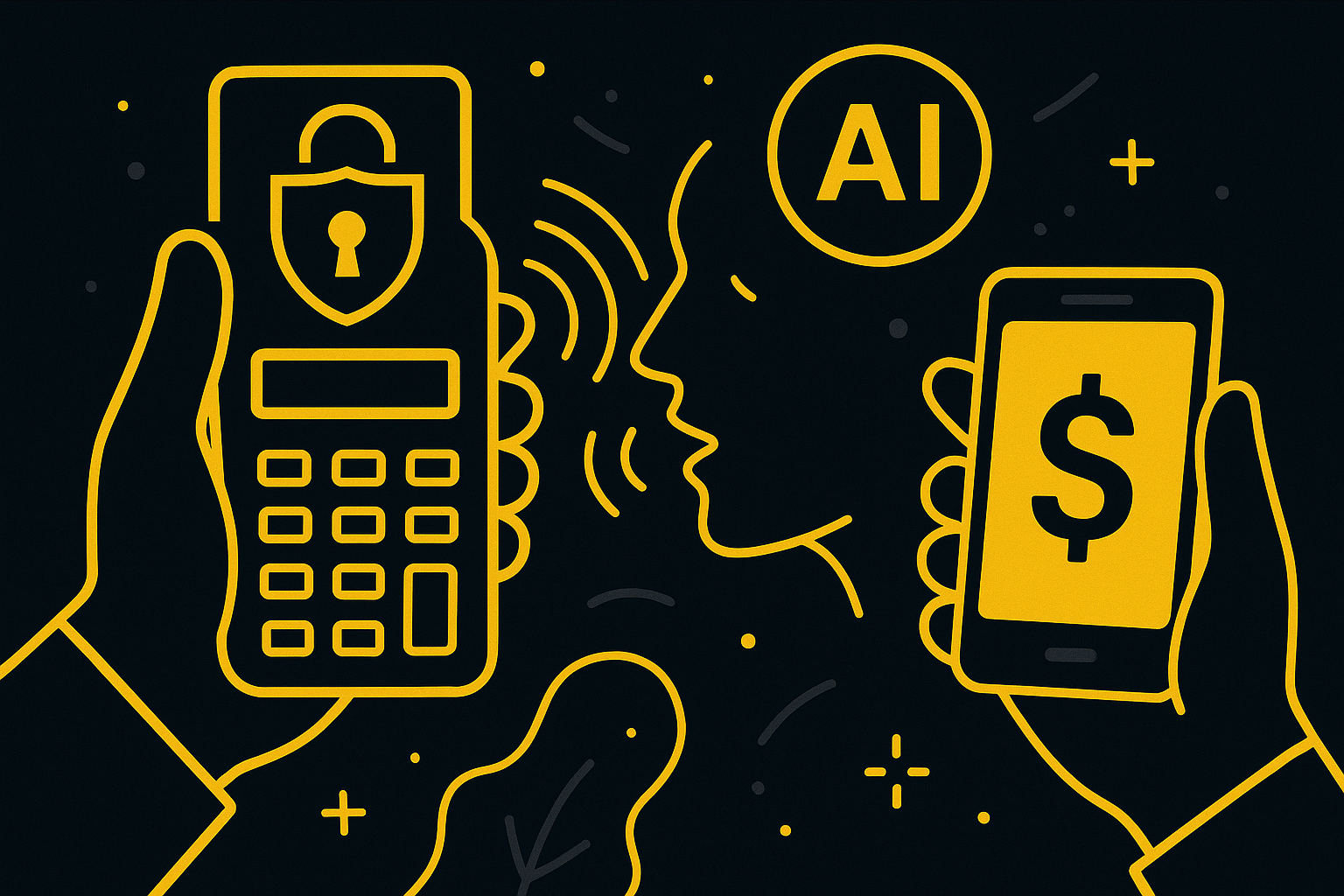
As voice AI transforms restaurant operations, a critical question emerges: can these systems safely handle credit card payments over the phone? With major restaurant chains like Applebee's and IHOP implementing Voice AI Agents to handle customer orders, the intersection of artificial intelligence and payment security has never been more important. (Newo.ai)
The Payment Card Industry Data Security Standard (PCI DSS) represents a security checklist created by major credit card companies to ensure businesses keep credit card data safe from theft. (Hoop.dev) For restaurant operators considering voice AI solutions, understanding PCI compliance isn't just about avoiding fines—it's about protecting your customers and your business reputation.
Modern AI hosts are already generating additional revenue of $3,000 to $18,000 per month per location, up to 25 times the cost of the AI host itself. (Hostie AI) But as these systems evolve to handle more complex transactions, including payment processing, operators must navigate the complex landscape of PCI DSS 4.0 requirements, tokenization flows, and call recording best practices.
PCI DSS stands for Payment Card Industry Data Security Standard, a comprehensive set of rules designed to protect credit card information during processing, storage, and transmission. (Hoop.dev) When voice AI systems handle credit card data—whether through spoken numbers, DTMF tones, or integrated payment flows—they must comply with these stringent requirements.
The challenge for restaurant operators lies in understanding how traditional PCI requirements apply to AI-powered voice systems. Unlike human staff who can be trained on data handling procedures, AI systems require built-in compliance mechanisms that automatically protect sensitive information throughout the entire interaction.
Voice AI systems handling payment data must address several critical PCI DSS requirements:
Data Storage Limitations: PCI DSS strictly prohibits storing sensitive authentication data after authorization, including full magnetic stripe data, card validation codes, and PINs. Voice AI systems must be designed to process this information in real-time without retention.
Encryption Requirements: All cardholder data transmitted over open, public networks must be encrypted. This includes voice data containing credit card information traveling between the customer, AI system, and payment processors.
Access Controls: Only authorized personnel should have access to cardholder data. For AI systems, this means implementing role-based access controls and ensuring that voice recordings containing payment information are properly secured.
Network Security: Voice AI platforms must maintain secure network configurations, including firewalls and network segmentation to protect cardholder data environments.
Tokenization represents the gold standard for protecting payment data in voice AI systems. Instead of storing actual credit card numbers, the system generates unique tokens that represent the payment information. These tokens are meaningless to potential attackers but can be used by authorized payment processors to complete transactions.
For restaurant voice AI systems, tokenization typically works through this flow:
Tokenization offers several advantages for restaurant operators implementing voice AI payment systems:
Reduced PCI Scope: By never storing actual payment data, restaurants can significantly reduce their PCI compliance scope, lowering both costs and complexity.
Enhanced Security: Even if a restaurant's systems are compromised, tokens are useless without access to the secure tokenization vault.
Operational Flexibility: Tokens can be safely stored in customer profiles, enabling repeat orders and subscription services without PCI concerns.
Simplified Compliance: With tokenization handling the sensitive data, restaurants can focus on securing their operational systems rather than payment data storage.
Restaurants field a high volume of phone calls from inquisitive tourists or diners running late, and many of these interactions now involve AI voice assistants. (Hostie AI) When these calls include payment information, proper recording and redaction become critical for PCI compliance.
Companies record calls for quality assurance to monitor service standards, train employees, ensure compliance, and resolve disputes. (Calilio) However, when payment data is involved, these recordings become subject to PCI DSS requirements.
Intelligent Voice offers a PCI compliance solution that combines advanced speech analytics with AI technology to automatically identify and redact sensitive credit card information from recorded customer interactions. (Intelligent Voice) This technology can be integrated with existing call recording and analytics systems across various sectors including financial, healthcare, and retail.
The solution works by:
For restaurant operators implementing voice AI with payment capabilities, several best practices ensure proper call handling:
Real-Time Redaction: Implement systems that identify and redact payment information as it's spoken, rather than attempting to clean recordings after the fact.
Segmented Recording: Consider systems that pause recording during payment collection, resuming only after sensitive data has been processed.
Automated Compliance Monitoring: Deploy AI-powered systems that continuously monitor recordings for potential PCI violations and alert compliance teams immediately.
Staff Training Integration: Ensure that human staff understand when and how to handle calls that transition from AI to human agents, particularly regarding payment data.
While specific details about iWallet's implementation aren't available in our research, the concept of PCI-compliant telephone ordering represents a significant advancement in voice payment technology. Such systems typically integrate several key components:
Secure Voice Gateways: Specialized hardware and software that encrypt voice communications from the moment payment data is spoken.
Real-Time Processing: Systems that process payment information immediately without storing sensitive data in intermediate systems.
Compliance Monitoring: Automated systems that ensure every transaction meets PCI DSS requirements and flag potential violations.
PolyAI's collaboration with PCI Pal demonstrates how voice AI companies are addressing payment security challenges through specialized partnerships. PCI Pal provides secure payment solutions that integrate with voice systems, offering:
Secure Payment Capture: Technology that securely captures payment information during voice interactions without exposing it to the main AI system.
Compliance Automation: Automated processes that ensure every payment transaction meets PCI DSS requirements.
Integration Flexibility: APIs and integration tools that allow voice AI systems to securely process payments without handling sensitive data directly.
The restaurant industry presents unique challenges and opportunities for PCI-compliant voice AI implementation:
High-Volume Operations: Restaurants characterized by high customer turnover, seating capacity, and sales require systems that can handle payment processing at scale while maintaining security. (Slang AI)
Multilingual Capabilities: In multicultural cities, AI systems offer distinct advantages with their multilingual capabilities, enabling smoother communication with diverse clientele while maintaining payment security standards. (Hostie AI)
Integration Requirements: Voice AI systems must integrate seamlessly with existing reservation and POS systems, enhancing operational efficiency while maintaining PCI compliance. (Hostie AI)
Hostie AI's platform is designed with restaurant operations in mind, automating the handling of calls, texts, and emails while managing reservations and takeout orders. (Hostie AI) When implementing payment capabilities, the system incorporates several security features:
Tokenization Integration: The platform can integrate with leading tokenization providers to ensure that payment data is never stored in restaurant systems.
Secure Communication Channels: All payment-related communications are encrypted and transmitted through secure channels that meet PCI DSS requirements.
Automated Compliance Monitoring: The system includes built-in monitoring that ensures all payment transactions comply with PCI DSS standards.
One of the key advantages of Hostie AI's approach is its ability to integrate seamlessly with existing reservation and POS systems. (Hostie AI) This integration capability extends to payment processing, allowing restaurants to:
Maintain Existing Workflows: Staff can continue using familiar POS systems while benefiting from AI-powered payment processing.
Centralized Reporting: Payment data from voice AI interactions can be consolidated with other transaction data for comprehensive reporting.
Unified Customer Profiles: Customer payment preferences and history can be maintained across all interaction channels.
AI hosts are already generating significant additional revenue for restaurants, with some locations seeing increases of $3,000 to $18,000 per month. (Hostie AI) As these systems scale to handle more payment transactions, maintaining PCI compliance becomes increasingly important.
The platform's architecture supports:
High-Volume Processing: Systems capable of handling multiple simultaneous payment transactions without compromising security.
Real-Time Monitoring: Continuous monitoring of payment processing to ensure compliance and identify potential issues immediately.
Automated Scaling: Infrastructure that automatically scales to meet demand while maintaining security standards.
When evaluating voice AI systems for payment processing, restaurant operators should ask vendors these critical questions:
PCI Certification Status:
Data Handling Practices:
Recording and Monitoring:
Beyond basic compliance questions, operators should evaluate the technical capabilities of potential voice AI payment systems:
Integration Capabilities:
Security Infrastructure:
Operational Considerations:
Before implementing voice AI payment processing, restaurants should conduct a thorough assessment:
Current State Analysis:
Compliance Gap Analysis:
With a clear understanding of requirements, restaurants can begin evaluating and testing voice AI solutions:
Pilot Program Design:
Compliance Validation:
Once pilot testing is complete and compliance is validated, restaurants can proceed with full deployment:
Staff Training and Procedures:
Ongoing Compliance Management:
The landscape of voice AI payment security continues to evolve rapidly. Several emerging technologies and standards are shaping the future:
Advanced Biometric Authentication: Voice recognition technology is becoming sophisticated enough to serve as a form of biometric authentication, potentially reducing reliance on traditional payment credentials.
Blockchain Integration: Some systems are exploring blockchain technology for secure, decentralized payment processing that could enhance security and reduce compliance complexity.
Enhanced AI Security: Machine learning algorithms are being developed specifically to detect and prevent payment fraud in real-time during voice interactions.
Several trends are likely to shape the future of voice AI payment processing in restaurants:
Increased Adoption: As AI assistants become more sophisticated and customers become more comfortable with voice interactions, adoption of voice payment systems is expected to accelerate significantly.
Regulatory Evolution: PCI DSS and other regulatory frameworks are likely to evolve to address the unique challenges and opportunities presented by voice AI systems.
Integration Standardization: Industry standards for integrating voice AI with payment systems are likely to emerge, making implementation easier and more secure.
Cost Reduction: As technology matures and adoption increases, the costs associated with implementing PCI-compliant voice AI payment systems are expected to decrease.
The integration of voice AI and payment processing represents a significant opportunity for restaurant operators to enhance customer experience while improving operational efficiency. However, success depends on implementing these systems with proper attention to PCI compliance and security best practices.
As AI hosts continue to generate substantial additional revenue for restaurants—with some locations seeing increases of $3,000 to $18,000 per month—the business case for voice AI implementation becomes increasingly compelling. (Hostie AI) But this success must be built on a foundation of security and compliance.
The key to successful implementation lies in understanding that PCI compliance isn't just a regulatory requirement—it's a fundamental component of customer trust. When customers feel confident that their payment information is secure, they're more likely to engage with voice AI systems and complete transactions.
For restaurant operators considering voice AI payment systems, the path forward involves careful vendor selection, thorough testing, comprehensive staff training, and ongoing compliance monitoring. By following the guidelines and best practices outlined in this article, restaurants can safely harness the power of voice AI while protecting their customers and their business.
The future of restaurant operations will increasingly involve AI employees working alongside human staff to create exceptional customer experiences. (Hostie AI) By implementing these systems with proper attention to security and compliance, restaurant operators can position themselves at the forefront of this transformation while maintaining the trust and confidence of their customers.
As the technology continues to evolve and mature, staying informed about best practices, regulatory changes, and emerging security technologies will be essential for maintaining competitive advantage while ensuring customer protection. The investment in proper PCI-compliant voice AI implementation today will pay dividends in enhanced customer satisfaction, operational efficiency, and business growth tomorrow.
Yes, voice AI systems can be PCI-compliant when properly implemented with tokenization, encryption, and secure data handling protocols. The key is ensuring the AI system never stores, processes, or transmits actual credit card data - instead using tokenized representations and secure payment gateways that meet PCI DSS 4.0 requirements.
Voice AI systems must comply with PCI DSS requirements including secure network architecture, data encryption in transit and at rest, access controls, and regular security monitoring. Critical requirements include tokenization of card data, secure transmission protocols, and ensuring the AI system cannot access or store sensitive authentication data like CVV codes.
Major chains implementing voice AI agents, such as Dine Brands (Applebee's and IHOP), typically use third-party PCI-compliant payment processors that handle the actual card data processing. The AI system captures order information while securely redirecting payment processing to certified payment gateways, ensuring compliance while maintaining operational efficiency.
Tokenization replaces sensitive credit card data with unique, non-sensitive tokens that have no exploitable value. For voice AI systems, this means the AI never handles actual card numbers - only tokens that can be safely processed and stored. This dramatically reduces PCI compliance scope and security risks while enabling seamless payment processing.
Restaurants should verify their voice AI vendor has current PCI DSS certification, conducts regular security audits, and provides detailed compliance documentation. Key questions include whether the system uses tokenization, how card data is transmitted, what security controls are in place, and whether the vendor assumes liability for payment data breaches.
Non-compliant systems expose restaurants to data breaches, regulatory fines up to $500,000 per incident, loss of payment processing privileges, and significant reputational damage. Additionally, restaurants may face lawsuits from customers whose payment data is compromised, making PCI compliance essential for both security and business continuity.
RELATED


